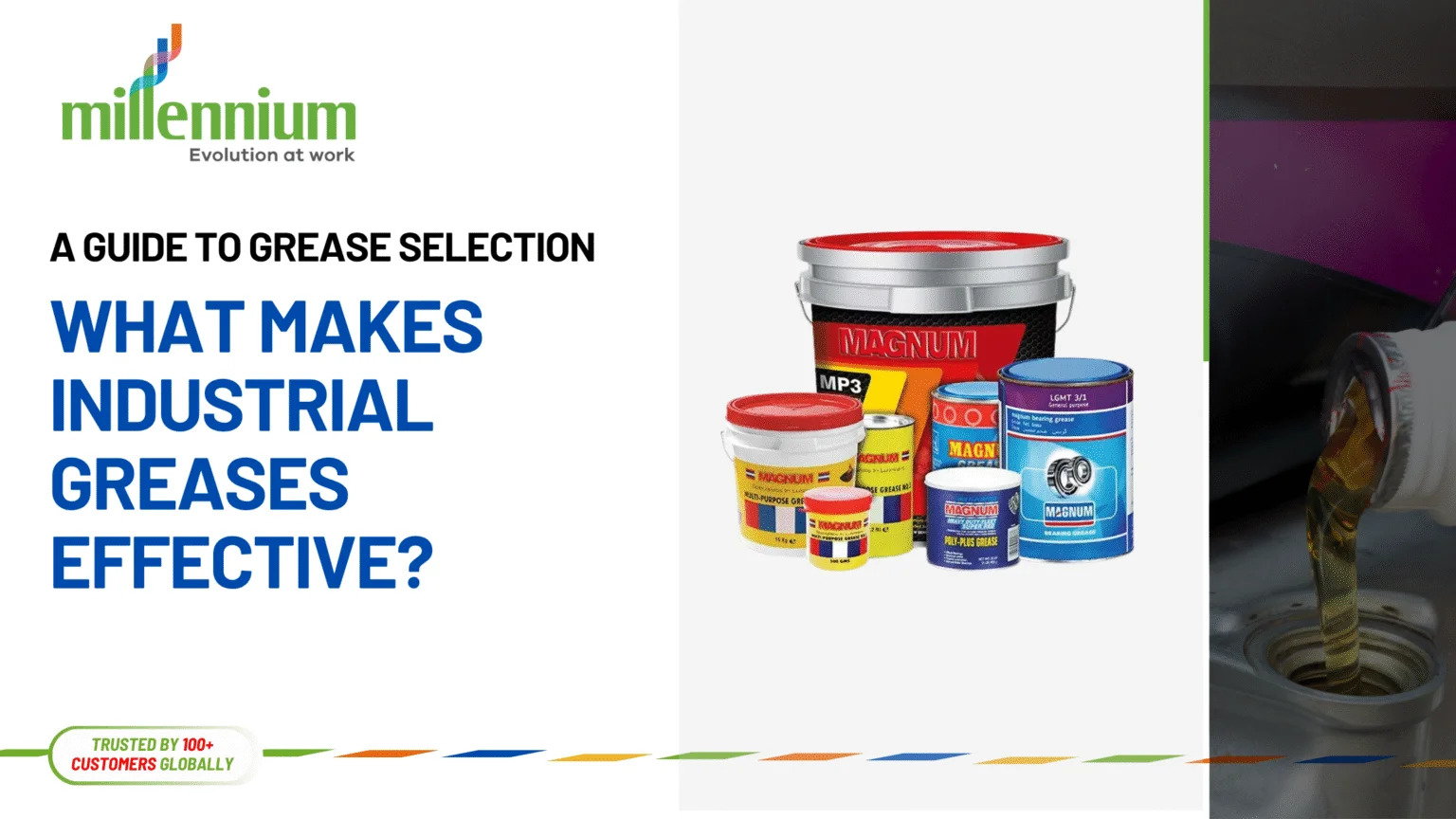Industrial greases play a vital role in keeping machinery running smoothly, reliably, and efficiently. In harsh environments where dust, moisture, heat, and heavy loads are common, the right grease ensures components remain protected and well-lubricated. Unlike oils, greases stay in place, resist leakage, and offer long-lasting protection—making them essential for both light-duty and heavy-duty industrial operations. This guide explains what makes industrial greases effective and provides insights into their types, uses, and how MAGNUM Grease aligns with modern industrial demands.
A Brief Overview of Industrial Grease
Industrial grease is a semi-solid lubricant made from three main components: base oil, thickener, and performance additives. The synergy between these elements determines the grease’s effectiveness under different operating conditions.
1. Base Oil
The base oil, which may be mineral or synthetic, makes up 70–90% of the grease composition.
-
Mineral oils are used for standard-temperature applications.
-
Synthetic oils provide better oxidation stability, thermal resistance, and long service life.
The viscosity of the base oil plays a key role in determining the grease’s ability to handle speed, load, and temperature variations.
2. Thickener
The thickener gives grease its structure. It acts like a sponge, holding the base oil and releasing it slowly during operation.
Common thickeners include:
-
Lithium
-
Lithium complex
-
Calcium sulfonate
-
Polyurea
-
Aluminum complex
The choice of thickener influences the grease’s mechanical stability, water resistance, and high-temperature performance.
3. Additives
Additives enhance specific functional properties. These may include:
-
Anti-wear (AW) agents
-
Extreme-pressure (EP) additives
-
Rust and corrosion inhibitors
-
Antioxidants
-
Tackifiers for adhesive strength
Together, these components enable greases to function under demanding industrial conditions.
Comparison of Grease Types
Types of industrial greases are engineered to perform optimally under specific working environments. Understanding their characteristics is crucial for selecting the right one.
1. Lithium Grease
Lithium grease is the most widely used multipurpose grease.
-
Good mechanical stability
-
Moderate water resistance
-
Ideal for bearings, automotive applications, and general industrial lubrication
It offers a balance of performance and affordability, making it suitable for everyday applications.
2. Lithium Complex Grease
Lithium complex grease is a stronger, more temperature-resistant version of lithium grease.
-
Operates effectively at higher temperatures
-
Excellent EP performance
-
Superior structural stability
Commonly used in heavy-duty machinery, steel plants, and high-speed bearing systems.
3. Calcium Sulfonate Grease
Known for exceptional water resistance and corrosion protection, calcium sulfonate greases are ideal for extremely wet or corrosive conditions.
-
Excellent load-carrying capacity
-
Natural EP properties (no added additives needed)
-
Outstanding rust protection
Favoured by marine, mining, and cement industries.
4. Polyurea Grease
These greases offer excellent oxidation resistance and long service life.
-
Ideal for sealed-for-life bearings
-
Performs well in electric motors
-
Good high-temperature stability
Polyurea greases are commonly seen in automotive alternators and electric motor bearings.
5. Aluminum Complex Grease
Aluminum complex greases provide strong water and heat resistance.
-
Good mechanical stability
-
Excellent washout resistance
-
Used in food processing, packaging, and general machinery applications
Food-grade versions (NSF H1) are widely used where incidental contact with food is possible.
6. Moly Grease (Molybdenum Disulfide Grease)
Moly greases contain solid lubricants for enhanced protection under heavy shock loads.
-
Reduces friction under boundary lubrication
-
Ideal for pins, bushes, and pivots
-
Used extensively in construction and mining equipment
Applications of Industrial Greases
Industrial greases are used across a wide range of sectors due to their ability to stay in place and resist harsh operational conditions.
1. Bearings
Greases are essential for lubricating rolling element bearings, wheel bearings, and electric motor bearings. They reduce friction, dissipate heat, and shield components from contaminants.
2. Heavy-Duty Construction and Mining Equipment
Machines such as excavators, loaders, and backhoes rely on greases to withstand heavy loads and shocks. Grease provides protection for pins, bushings, joints, and linkages that experience continuous movement and high stress.
3. Manufacturing and Industrial Machinery
Conveyors, presses, motors, and pumps benefit from greases that maintain consistency under constant load. These greases prevent metal-to-metal contact and extend equipment life.
4. Marine Applications
Marine environments require greases that can withstand saltwater exposure and frequent washdowns. Calcium sulfonate and aluminum complex greases are widely used for deck machinery, winches, cranes, and steering components.
5. Automotive and Transportation
Greases are used for chassis components, wheel bearings, U-joints, suspension parts, and fifth wheels. High-temperature and EP greases are preferred in automotive applications.
6. Food Processing Industries
Aluminum complex and calcium sulfonate food-grade greases provide lubrication while maintaining compliance with safety standards. These greases offer excellent water resistance, a must in washdown-heavy environments.
MAGNUM Grease Product Fit
MAGNUM Grease products are engineered to meet the lubrication needs of industries operating under demanding and variable conditions. With a strong focus on durability, temperature stability, and wear protection, MAGNUM greases deliver reliable performance across multiple applications.
1. High-Temperature and EP Performance
MAGNUM lithium complex greases handle high temperatures and heavy loads with ease. They provide superior film strength, ensuring components remain protected even under extreme operating pressures.
2. Excellent Water and Corrosion Resistance
MAGNUM calcium sulfonate greases offer exceptional washout resistance, making them ideal for marine, mining, and wet industrial environments. Their natural corrosion-resistant properties extend equipment life.
3. Extended Lubrication Intervals
With high-quality base oils and advanced additives, MAGNUM greases maintain stability for longer periods. This reduces relubrication frequency and maintenance downtime.
4. Suitable for Multiple Industrial Applications
Whether it’s bearings, construction machinery, electric motors, or food processing equipment, MAGNUM provides tailored grease solutions designed to enhance performance and reliability.
Conclusion
Effective industrial greases are the backbone of machinery performance, offering lubrication, protection, and longevity under harsh operating conditions. By understanding grease composition, comparing grease types, and recognizing application-specific requirements, industries can make informed decisions that improve efficiency and reduce maintenance costs. With their high-quality formulations and reliable performance, MAGNUM Greases deliver trusted solutions for modern industrial lubrication needs.
